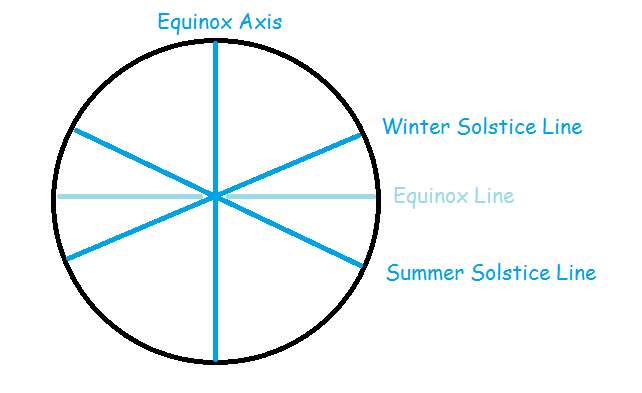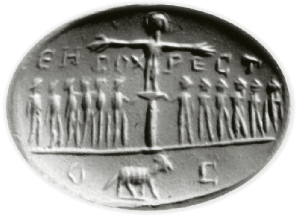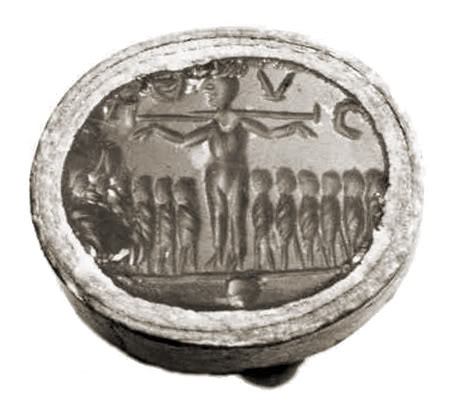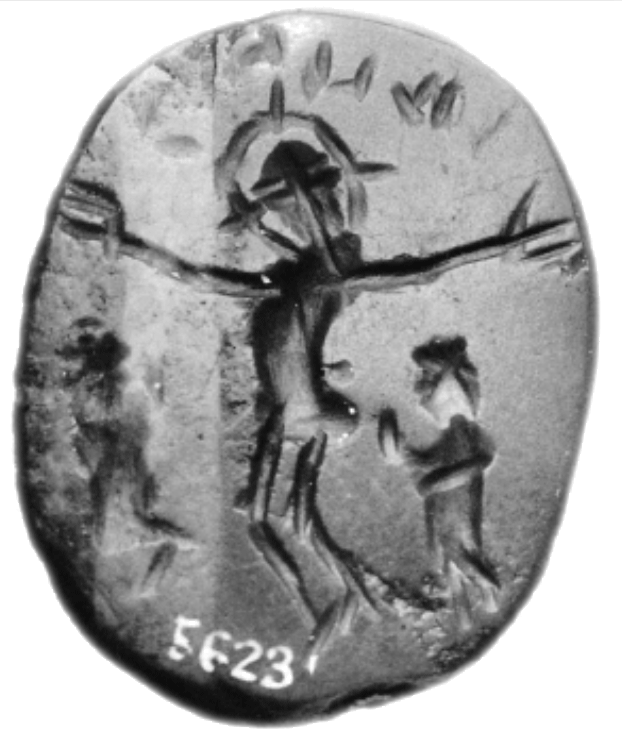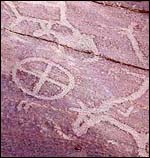|
Veteran Member
Join Date: Jun 2010
Location: seattle, wa
Posts: 9,337
|

Here's where Clement is getting his ideas about Jacob and the mystery of 'whitening' - not surprisingly, Philo of Alexandria who writes:
Quote:
|
But we, even after we have been instructed, make no progress in learning; but some persons, having a self-taught natural instinct, purify what is good from the evils which surround it, as Jacob did, he who was surnamed the practicer of virtue; for he "peeled the rods, leaving on the white bark, having stripped off all the Green;" (Gen 30:37) in order that the dark and dusky vanity in the middle being taken away in every case, a white appearance might be displayed, which should be produced so as to be akin to it, not by diversified art but by nature; in reference to which it is also commanded in the law which was established in cases of leprosy, that "the man who was not infected with any variation of colour, but who was white all over from the head to the extremity of his feet, should be Pure." In order that, according to the similitude of the body, those who have discarded the crafty, and unscrupulous, and ambiguous, and uncertain disposition of mind, may embrace the simple, uncoloured, unambiguous, plain complexion of truth; therefore, to say that the tree is purified, contains a principle, the assertion of which is founded surely in truth, but to make the same statement with respect to the fruit is saying what is not equally clear or credible; for no cultivator of figs or grapes, or, in sort, of any fruit whatever, purifies them. (Noah's Work as a Planter 110 - 112)
|
Clearly Philo conceived of the 'whitening' of the sheep as an allegory for the purification of humanity. And again elsewhere:
Quote:
Accordingly, Jacob, the practiser of contemplation, conceiving this to be an employment most closely akin to virtue, endured "to be the shepherd of the flocks of Laban,"{18}{#ge 30:36.} a man wholly devoted to colours and to forms, and, in sort, to lifeless substances; and he tended not all of them, but the residue only. Now, what is the interpretation of this? The irrational animal is of a twofold character; one consisting in a misuse of that reason which should direct the choice, and such we call people out of their mind: the other consisting in an absolute privation of reason, which we see to exist in these animals which we call brutes. (47) Now, the irrational impulses of the mind, I mean those faculties which are developed in a misuse of that reason which should direct the choice, the sons of Laban, "when they had departed three days' Journey,"{19}{ibid.} paid great regard to; being thus under a symbol cut off from virtue for the whole period of their life; for time is capable of being divided into three parts, consisting of the past, and the present, and the future. But these animals which are irrational in the second sense, and which are destitute not only of right reason but of all reason whatever, under which class the brute beasts are reckoned, the practiser of contemplation will think worthy of all his care, considering that their errors have proceeded, not so much from deliberate wickedness as form ignorance, which was devoid of a guide. (48) Ignorance, therefore, being but a slight and also an involuntary calamity, admits of a cure which is neither difficult nor troublesome, namely instruction. But, wickedness being a voluntary disease of the soul, admits of no remedy but such as if difficult, and almost impossible. Therefore his sons, as men who have been instructed by a father of exceeding wisdom, even if they do go down to Egypt, that is to say, to the body which is inclined to be a slave to the passions, and even if they meet with Pharaoh, that squanderer of all good things, who appears to be the sovereign of the composite animals, being not at all bewildered with the abundance of the preparations which they behold, confess that they are shepherds of sheep, and not only they but their fathers Also.{20}{#ge 47:3.}
XII. (49) And yet no one would ever utter so great a boast in consequence of any power and sovereignty as these men do in respect of their being shepherds; to those indeed who are able to reason correctly, it is a more noble employment than that of a king, to be able to govern the body and the outward senses, and the belly, as one might govern a city or a country, and to restrain the pleasures which have their seat around the belly, and the other passions, and one's tongue, and, in short, all the different parts of one's composite nature, with vigour and exceeding power, and again to guide them in the right way with due gentleness; for it is necessary at one time to act like a charioteer who slackens the reins with which he holds the horses which are yoked to his chariot, and at other times one must draw them tight, and resist the haste of the steeds, that no precipitation and impetuous pursuit of outward objects may take place, and lead them into rebellion. And I admire that guardian of the laws, Moses, who, thinking it a great and noble task to be a shepherd, has attributed that employment to himself; for he manages and conducts the doctrines of Jethro, leading them from the tumultuous vexations of political affairs into the desert, for the purpose of avoiding all temptation to injustice. "For he led the sheep into the Wilderness." (Ex 3:1) The consequence of which conduct of his was that "Every shepherd of sheep is an abomination to the Egyptians."{Gen 46:34) For every man who loves his passions hates right reason as the governor and guide to good things; just as foolish children hate their tutors and teachers, and every one who reproves them or corrects them, or would lead them to virtue. But Moses says that he "will sacrifice the abominations of the Egyptians to God." (Ex 8.26) namely the virtues which are faultless and most becoming victims, which every foolish man abominates. So that very appropriately, Abel, who brought the best offerings to God, is called a shepherd; but he, who offered every thing to himself and to his own mind, is called a tiller of the earth, namely Cain. And what is meant by tilling the Earth (Gen 4:2) we have shown in our previous treatises. (On the Sacrifices of Cain and Abel) (On the Sacrifices of Cain and Abel)
|
and again
Quote:
These, then, are the occupations of shepherds who prefer those things which are useful, though mixed with unpleasantness, to those which are pleasant but pernicious. Thus, at all events, the occupation of a shepherd has come to be considered a respectable and profitable employment, so that the race of poets has been accustomed to call kings the shepherds of the people; but the law giver gives this title to the wise, who are the only real kings, for he represents them as rulers of all men of irrational passions, as of a flock of sheep. On this account he has attributed to Jacob, the man who was made perfect by practice, a skill in the science of a shepherd, saying: "For he is the shepherd of Laban's Sheep."{3} That is, of the sheep of the foolish soul, which thinks only those things good which are the objects of the outward senses and apparent to them, being deceived and enslaved by colours and shadows; for the name, Laban, being interpreted, means "whitening." He also attributes the same skill to the all-wise Moses, for he also is represented as the shepherd of the mind which embraces pride in preference to truth, and which receives appearance rather than reality; for the interpretation of the name Jethro is "superfluous," and superfluity is pride adopted for the purpose of introducing error into correct life; which is the cause why different things are looked upon as right in different cities, and not those principles which ought to be looked upon as just everywhere, inasmuch as it never sees, not even in a dream, the common and immovable principles of the justice of nature.
For, it is said, that "Moses was the shepherd of the sheep of Jethro, the priest of Midian." And this man himself prays that the flock may not be left without a shepherd, meaning by the flock the whole multitude of the parts of the soul; but that they may meet with a good shepherd, who will lead them away from the nets of folly, and injustice, and all wickedness, and conduct them to the doctrines of learning and all other virtue; for, says Moses, "Let the Lord the God of spirits and of all flesh look down upon man and upon this Assembly." And then, a little further on, he adds, "And the assembly of the Lord shall not be like sheep who have no shepherd."
But is it not well worth praying for, that the flock which is akin to each individual of us, and of so much value, may not be left without any superintendent or governor, so that we may not, through being filled with a love of the worst of all constitutions, an ochlocracy, which is a base copy of the best form, democracy, pass our lives for ever and amid tumults, and disorders, and intestine seditions? Certainly it is not anarchy alone that is an evil, through being the parent of ochlocracy, but also the insurrection of any lawless and violent force against authority; for the tyrant who, by his own nature is hostile, is, in the case of cities, a man, but in the case of the body and the soul, and all transactions having reference to either, he is a mind resembling the brute beasts, besieging the citadel of each individual; but not only are these dominations unprofitable, but so also are the governments and authority of other persons, who are very gentle, for gentleness is a line of conduct very likely to be despised, and injurious to both parties, both to the rulers and the subjects. To the one from the disregard with which their subjects treat them, so that they are unable to manage any matter, whether of public or of their own private business successfully, are sometimes even compelled to abdicate their authority; and to the others, because of their continual disrespect to their governors, disregarding all persuasion, so that they contract a habit of selfwilled insolence, a possession of great evil.
We must then think that one of these classes of governors differs in no respect from keepers of sheep, while the others resemble the sheep themselves, for the governors persuade the governed to be luxurious, through the extravagance of the supplies with which they provide them; and the governed being unable to bear their satiety become insolent; but what is really desirable is, that our mind should govern all our conduct, like a goatherd, or a cowherd, or a shepherd, or, in short, like any herdsman of any kind; choosing in preference to what is pleasant that which is for the advantage both of himself and of his flock.
But the providence of God is the principal and almost the only cause that the divisions of the soul are not left entirely without any governor, and that they have met with a blameless and in all respects good shepherd. In consequence of whose appointment it is impossible that the company of the mind should become scattered; for it will of necessity appear in one and the same order, looking to the authority of its one governor, since the heaviest burden of all is to be compelled to obey a variety of rulers. Thus, indeed, being a shepherd is a good thing, so that it is justly attributed, not only to kings, and to wise men, and to souls who are perfectly purified, but also to God, the ruler of all things; and he who confirms this is not any ordinary person, but a prophet, whom it is good to believe, he namely who wrote the psalms; for he speaks thus, "The Lord is my shepherd, and he shall cause me to lack Nothing;" and let every one in his turn say the same thing, for it is very becoming to every man who loves God to study such a song as this, but above all this world should sing it. For God, like a shepherd and a king, governs (as if they were a flock of sheep) the earth, and the water, and the air, and the fire, and all the plants, and living creatures that are in them, whether mortal or divine; and he regulates the nature of the heaven, and the periodical revolutions of the sun and moon, and the variations and harmonious movements of the other stars, ruling them according to law and justice; appointing, as their immediate superintendent, his own right reason, his first-born son, who is to receive the charge of this sacred company, as the lieutenant of the great king; for it is said somewhere, "Behold, I am he! I will send my messenger before thy face, who shall keep thee in the Road." Let therefore all the world, the greatest and most perfect flock of the living God, say "The Lord is my shepherd, and he shall cause me to lack nothing," and let every separate individual say the same thing; not with the voice which proceeds from his tongue and his mouth, extending only through a scanty portion of the air, but with the wide spreading voice of the mind, which reaches to the very extremities of this universe; for it is impossible that there should be a deficiency of anything that is necessary, where God presides, who is in the habit of bestowing good things in all fulness and completeness in all living beings.
But there is a very beautiful encouragement to equality contained in the song before mentioned; for in real truth, the man who appears to have everything else, and yet who is impatient under the authority of one master, is incomplete in his happiness, and is poor; but if a soul is governed by God, having that one and only thing on which all other things depend, it is very naturally in no need of other things, regarding not blind riches, but only such as are endowed with real and acute Sight. All true disciples have come to conceive an earnest and unalterable love for that; and therefore laughing at the mere keeping of sheep, they have directed their attention to the attainment of a shepherd's knowledge; and a proof of this is to be found in the case of Joseph, who was always studying that knowledge which is conversant about the body and vain opinions, not being able to rule and govern irrational nature (for it is customary for old men to be appointed to offices of irresponsible authority; but this man is always young, even if after a lapse of time he may come to support old age, which has at last reached him); and being accustomed to nourish this and to lead it on to growth, he expects to be able to persuade the lovers of virtue to change and come over to him, in order that in so changing to irrational and inanimate objects, they may have no leisure for applying themselves to the studies of a rational soul.
For Moses represents Joseph as saying, "If the king," that is to say, the mind, the king of the body, "shall ask you, What is your occupation? answer, We are men, the keepers of Cattle." When they hear this they are naturally impatient, not liking the idea, while they are rulers, of confessing that they hold the rank of subordinates; for those who supply food to the outward senses, through the abundance of the objects perceptible only by them, become the slaves of those who are nourished, like servants who pay to their mistresses a compulsory reverence every day; but those who preside over them are rulers, and they bridle the vehement impetuosity with which they are hurried on to luxury. At first therefore, although they do not hear what is said with any pleasure, they will still keep silence, thinking it unseemly to discuss the difference between the employment of a keeper of cattle and a shepherd, before those who do not understand it; but subsequently, when a contest about these things arises, they will contend with all their power, and will never desist till they have carried their point by main force, having exhibited the liberality, and nobleness, and royal character of their nature to the living God. Accordingly when the king asks, "What is your occupation?" they will answer "We are shepherds, we and our fathers."
Would they not then appear to boast as much of their occupation as shepherds, as the king himself, who is conversing with them, does of his mighty power and dominion? At least they are testifying their high opinion of the profession of life which they have adopted, not in honour of themselves alone, but of their father also, as being worthy of all possible care and diligence; and yet, if the discussion had been merely about the care of goats or sheep, perhaps they would have been ashamed to make such an admission through desire to avoid dishonour; for such occupations are accounted inglorious and mean among those who are loaded with great prosperity, without being at the same time endowed with prudence, and especially among kings.
And the Egyptian character is by nature most especially haughty and boastful whenever so slight a breeze of prosperity does merely blow upon it, so that men of that nation look upon the pursuits of life and objects of ambition of ordinary men, as subjects for laughter and downright ridicule. But since the matter before us, at present, is to consider the rational and irrational powers in the soul, those persons will naturally boast, who are persuaded that they are able to master the irrational faculties, by taking the rational ones for their allies. If therefore any envious or captious person should blame us, and say, "How then have ye, who are devoted to the employment of shepherds, and who profess to be occupied in the care and management of the flocks which belong to you, ever thought of approaching the country of the body and the passions, namely Egypt? and why have ye not turned your voyage in another direction? You must say to him in reply, with all freedom of speech, We have come hither as sojourners, not as inhabitants." For in reality every soul of a wise man has heaven for its country, and looks upon earth as a strange land, and considers the house of wisdom his own home; but the house of the body, a lodging-house, on which it proposes to sojourn for a while. Therefore since the mind, the ruler of the flock, having taken the flock of the soul, using the law of nature as its teacher, governs it consistently and vigorously, rendering it worthy of approbation and great praise; but when it manages it sluggishly and indulgently, with a disregard of law, then it renders it blameable. Very naturally, therefore, the one will assume the name of a king, being addressed as a shepherd, but the other will only have the title of a confectioner, or of a baker, being called a keeper of sheep, supplying the means of feasting and gluttonous eating to cattle accustomed to gorge themselves to satiety. (On Husbandry)
|
|


